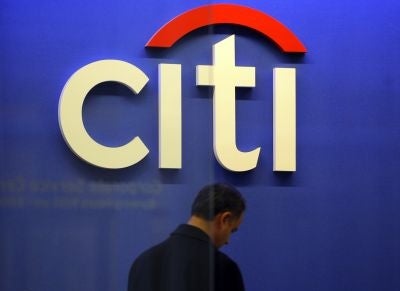Latest banking scandal costs Citigroup $7bn
Under the settlement, Citigroup has agreed to pay $2.5bn to help consumers it harmed

Citigroup agreed a $7bn (£4bn) settlement yesterday to resolve civil claims that it misled investors about the quality of its toxic mortgage-backed bonds sold before the 2008 financial crisis. The deal brings to an end months of horse-trading and political posturing between the bank and the US Department of Justice.
The department, anxious to prove it is punishing financial institutions that helped cause the financial crisis, stressed that a $4bn civil penalty included in the settlement is the largest ever of its kind and that the deal does not absolve Citigroup or its employees from possible criminal charges in the future.
However, the deal does avoid a department lawsuit that was in the making until last month, when an unexpected news headline caused a change of plan, according to The New York Times.
The Justice Department feared news that a suspect in the attack on the United States Mission in Benghazi, Libya’s second-biggest city, had been captured would overshadow its case against Citigroup, so it delayed the lawsuit – creating an opening for 11th-hour negotiations that eventually led to yesterday’s deal.
“This historic penalty is appropriate, given the strength of the evidence of the wrongdoing committed by Citi,” the US Attorney General Eric Holder said.
“The bank’s activities contributed mightily to the financial crisis that devastated our economy in 2008… Citi is not the first financial institution to be held accountable by this Justice Department, and it will certainly not be the last.”
As part of the settlement, the Justice Department said Citigroup “acknowledged it made serious misrepresentations to the public – including the investing public – about the mortgage loans it securitised in residential mortgage-backed securities”.
The Justice Department said Citigroup securitised and sold residential mortgage-backed bonds with underlying mortgage loans that it knew had defects.
One Citigroup trader, the department said, wrote in an email that he “went through the diligence reports and think[s] [they] should start praying … [he] would not be surprised if half of these loans went down… It’s amazing that some of these loans were closed at all.” Despite knowing many of the mortgages were toxic, Citigroup went ahead and securitised the loan pools containing the defective mortgages and sold the resulting bonds to investors for billions of dollars.
Citigroup’s conduct, along with similar behaviour by other banks that bundled toxic loans into bonds and misled the investors who bought those securities, contributed greatly to the financial crisis, the department said.
Under the settlement, Citigroup has agreed to pay $2.5bn to help consumers it harmed. This includes loan modifications, providing helping with refinancing, down payments and closing costs, and donations to organisations that help to create affordable rental housing for low-income families.
Michael Corbat, the chief executive of Citigroup, said: “We also have now resolved substantially all of our legacy RMBS [residential mortgage-backed securities] and CDO [collateralised debt obligations] litigation. We believe that this settlement is in the best interests of our shareholders, and allows us to move forward and to focus on the future, not the past.”
Join our commenting forum
Join thought-provoking conversations, follow other Independent readers and see their replies
Comments